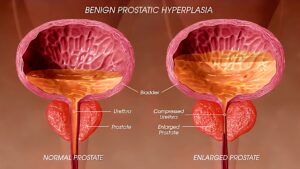According to the National Institute of Diabetes and Digestive and Kidney Diseases, over 14 million men in the United States have an enlarged prostate. The risk rises with age—about 50% of men over 50 experience it, and the prevalence reaches nearly 90% in men aged 80 and above.
Maintaining a healthy prostate is crucial for every man. However, as we get older, and due to certain risk factors, some men may develop benign prostatic hyperplasia (BPH), which is essentially an enlargement of the prostate.
BPH can lead to uncomfortable symptoms that affect daily life. Given its widespread occurrence, it’s helpful to understand the warning signs, causes, and ways to manage it. Family physician Ken D. Berry, MD, shares seven practical strategies to help shrink an enlarged prostate naturally.
Signs of an Enlarged Prostate
The prostate is a small gland in the male reproductive system, located just below the bladder. It plays a key role in producing seminal fluid and regulating hormones.
Because of its position, an enlarged prostate can press against the urethra, the tube that carries urine out of the bladder. This pressure can make urination more difficult and cause the bladder to work harder.
Common symptoms of an enlarged prostate include:
Frequent urination, day and night (nocturia)
Difficulty postponing urination
Weak or interrupted urine flow
Urinary leakage or incontinence
Trouble starting urination
Feeling like the bladder isn’t completely empty
Pain while urinating or after ejaculation
Urine that looks or smells unusual
Recurrent urinary tract infections
Not every man with BPH experiences symptoms, but if any of these occur, consulting a doctor is recommended for proper diagnosis.
Causes of an Enlarged Prostate
Nearly all men will experience some degree of prostate enlargement in their lifetime. Aside from aging, risk factors include family history, physical inactivity, and obesity.
Dr. Berry also highlights hyperinsulinemia—high levels of insulin in the blood—as a significant but often overlooked contributor to BPH. Studies suggest a link between elevated insulin and prostate enlargement.
High insulin may stimulate the liver to produce more insulin-like growth factor 1 (IGF-1), which promotes prostate growth. At the same time, insulin may reduce levels of insulin-like growth factor binding protein-3 (IGFBP-3), a protein that normally helps regulate growth.
7 Ways to Support Prostate Health and Reduce Enlargement
1. Cut Out Sugar
Since high insulin levels can contribute to prostate growth, reducing sugar intake is key. Avoid all forms of sugar, including added sugars and natural sources like honey and fruit, to help manage insulin levels.
2. Limit Grains
Refined and processed grains—such as pasta, white rice, and white bread—can spike insulin levels. Even whole grains like wheat and oats are broken down into sugars, so moderation is important.
3. Avoid Soy
Soy contains phytonutrients called isoflavones, which mimic estrogen. Increased estrogen in men may reduce testosterone levels, potentially contributing to prostate enlargement.
4. Skip Low-Fat Dairy
Opting for full-fat dairy instead of low-fat may help control insulin levels. Some studies suggest a link between low-fat dairy consumption and higher insulin levels, which can worsen BPH symptoms.
5. Avoid Vegetable Seed Oils
Many vegetable oils—such as sunflower, corn, soybean, rice bran, and cottonseed oil—are high in omega-6 fatty acids. Excess omega-6 can promote chronic inflammation and potentially increase prostate size. Healthy omega-3 fats from fatty fish may help reduce insulin levels and support prostate health.
6. Follow a Low-Carb Diet
Low-carb eating plans, like keto, Atkins, or the Mediterranean diet, can improve insulin sensitivity and lower insulin levels, helping manage prostate enlargement.
7. Try Intermittent Fasting
Intermittent fasting—limiting eating to certain hours of the day—can not only support weight management but may also help lower insulin levels, benefiting prostate health.


